Iranian FM Holds Talks With Hezbollah Officials In Lebanon
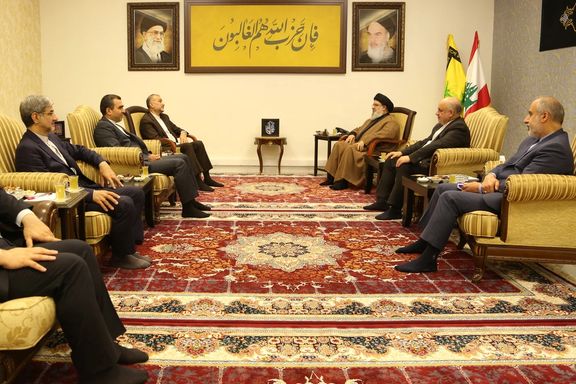
Iran’s Foreign Minister Hossein Amir-Abdollahian engaged in discussions with Hassan Nasrallah, the Secretary-General of Hezbollah in Lebanon.

Iran’s Foreign Minister Hossein Amir-Abdollahian engaged in discussions with Hassan Nasrallah, the Secretary-General of Hezbollah in Lebanon.
Media outlets with close ties to Hezbollah have not provided additional information about the nature and outcomes of the meeting.
Amir-Abdollahian also held discussions with the Speaker of Lebanon's Parliament Nabih Berri.
The visit to Lebanon follows a two-day visit to Syria, where Amir-Abdollahian held talks with President Bashar al-Assad to discuss the importance of strengthening regional ties. Whilst in Damascus, Amir-Abdollahian also commended the recent developments in Iran-Saudi relations, emphasizing their “mutual benefits and regional significance”.
The FM’s trip to both Syria and Lebanon coincides with ongoing reports of Israeli attacks on quasi-military groups affiliated with the Islamic Republic in Syria.
During a press conference, Amir-Abdollahian called for the withdrawal of US troops from the region and criticized Israeli airstrikes targeting sites in Syria, warning that such actions would inevitably invite retaliatory measures. “No party is capable of blocking historic transportation routes,” he said.
Israel has carried out numerous airstrikes on targets in government-controlled parts of Syria in recent years, often targeting Iranian-backed armed groups and concentrations of Iranian weaponry transferred to Syria.
Tehran has been a staunch supporter of Bashar al-Assad's government since the eruption of the Syrian civil war in 2011. Iran has provided both military and financial backing, deploying its own military personnel, Lebanese Hezbollah, and militias from Afghanistan, Iraq, and Pakistan to bolster President Assad's forces in their battle against opposition groups.
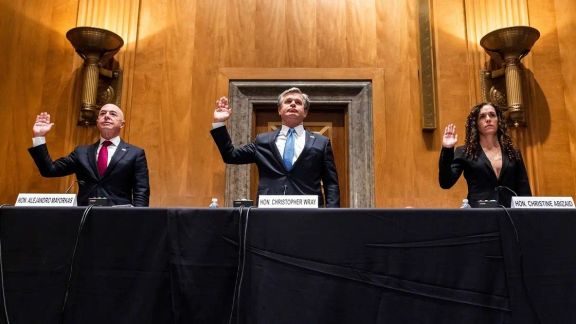
As information about secret talks with Tehran remain scarce, US lawmakers demand to know how American officials are being protected against Iran’s threats.
Reps. Mark Green (R., Tenn.), the House Homeland Security chair, and August Pfluger (R., Texas) have written to Homeland Security Secretary Alejandro Mayorkas, FBI Director Christopher Wray and Director of National Counterterrorism Center Christine Abizaid, “to request additional information about the persistent threats posed by Iran’s campaign to direct operations against U.S. persons or other targets in the U.S. homeland.”
Since the targeted killing of Qasem Soleimani, Iran’s top military and intelligence operator in the Middle East, in January 2020, the Iranian regime has repeatedly threatened revenge of former Trump administration officials.
The Justice Department revealed on August 10, 2022, that an operative of Iran’s Revolutionary Guard tried to hire a hitman in the US to kill former National Security Adviser John Bolton.
Bolton told Iran International Television at the time that he was not surprised an indictment was unsealed because he was kept informed “in general terms until late in 2021 when it was determined I would again get secret service protection.”
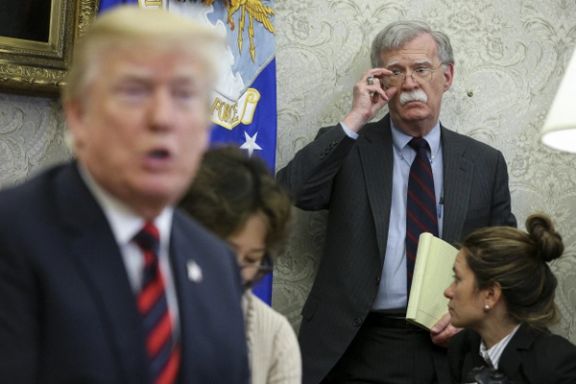
Congressmen Green and Pfluger citing Bolton’s case also mentioned threats against former Secretary of State Mike Pompeo and others. “Further, credible threats by Iran have continued to persist against Pompeo as well as his former top aide, Brian Hook, who served as special representative for Iran during the prior administration.”
The letter cited Iran’s militant proxy the Hezbollah, which is designated as a Foreign Terrorist Organization by the United States, and its global reach. It cited testimony by FBI Director Wray who told Congress that the Lebanese Shiite group has sent operatives “to build terrorist infrastructure worldwide. The arrests of individuals in the United States allegedly linked to Hizballah’s main overseas terrorist arm, and their intelligence collection and procurement efforts, demonstrate Hizballah’s interest in long-term contingency planning activities here in the Homeland.”
The lawmakers expressed concern that the Biden administration continues to engage with Iran for a nuclear deal, while these activities continue.
“To assist the Committee’s examination of the threats posed by Iran in the U.S. homeland, we request that DHS, the FBI, and NCTC provide Committee staff a classified briefing no later than September 14, 2023 about these ongoing threats, to include but not limited to, information about the number of active plots by Iran or its proxies against U.S. persons living in the United States, as well as information about your respective agencies’ coordination efforts for threat intelligence to counter Iran’s activities,” the letter said.
In August the administration agreed to allow $6 billion of frozen Iranian funds in South Korea to be unblocked, after allowing $2.7 billion to be released from Iraq in June. Although the reason for these steps is presented as a hostage release deal, numerous reports have indicated the possible existence of more secret arrangements.
Iran has reportedly reduced the pace of its uranium enrichment, while the Biden administration look the other way as Tehran boosts its oil exports to China in violation of US sanctions. Iran’s oil exports in August reached nearly 2 million barrels per day, regaining almost all its lost market since the Trump administration withdrew from the JCPOA nuclear agreement and imposed sanctions in 2018.
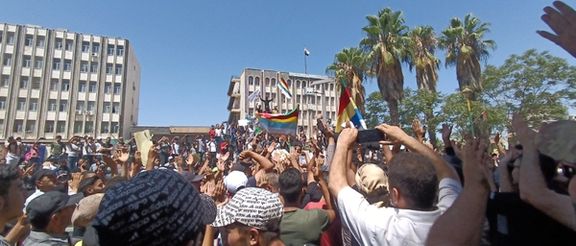
Protests in Syria continue for the second consecutive week as demands for economic reform and reducing Iran's influence escalate into calls for the president's removal.
Protesters, demanding an end to President Bashar al-Assad's authoritarian rule, earlier closed the ruling Baath party headquarters in Sweida, a southwestern Syrian Druze city. Similar fervent rallies have also been reported in Aleppo, Daraa, Deir Ezzor, and Jableh.
Demonstrators are calling for sweeping political changes while decrying deteriorating living standards, the continued incarceration of political dissidents, rampant corruption, and poor governance.
The immediate trigger for the protests was the government's decision earlier this month to cut fuel subsidies, a move that sent shockwaves through a populace already grappling with the precipitous decline of the Syrian lira. As the value of the currency plummeted, so did the people's patience.
Ironically, Iran which has supported Assad's regime since 2011 with troops and economic assistance to the tune of $50 billion, is also grappling with severe shortages of gasoline and mulling a hike in prices.
Youths sealed the gates of the Baath party building, led by Assad, with welding machines. This rising dissent in once-loyal areas poses a significant challenge to Assad's hold on power after winning a more than decade-long civil war with crucial support from Russia and Iran. Scores of local branches of the Baath party whose officials hold top government posts were also closed by protesters in one province, with its cadres fleeing, Reuters cited residents as saying.
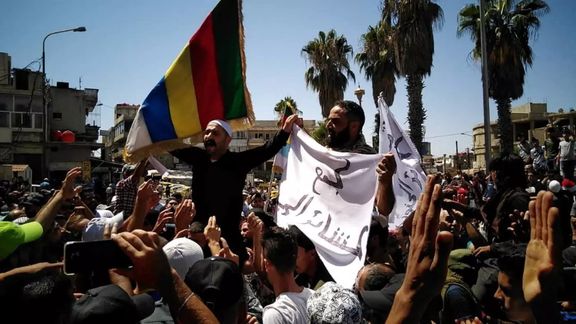
Civic activists and witnesses on the ground report that the protests show no signs of abating as the demonstrators demand reforms to address their grievances and to forge a more equitable future.
"Step down Bashar, we want to live in dignity," protesters chanted in Sweida’s main square where Druze top spiritual leaders have given their blessing for their protests without endorsing calls for an end to five decades of Assad family rule.
Unlike in the past, Sweida's elders and tribal leaders, previously aligned with Assad, are no longer neutral observers. They actively encourage the protests, marking a significant shift in their stance. The chants on the streets echo those from the 2011 Syrian uprising.
According to Human Rights Watch (HRW), the living conditions are worsening in Syria, with about 90 percent of the population living below the poverty line and 12.4 million Syrians suffering from food insecurity.
Concerns have also grown regarding Iran's influence in Syria. Demonstrators in Sweida demand the complete withdrawal of Iranian forces from their country, citing the presence of Iranian-backed militias as a contentious issue contributing to violence and instability.
Iran intervened in the Syrian civil war as early as 2011 to defeat a rebellion against Assad. Syria has become a key battleground between Iran and its enemies, and expands its presence in the region. Israel, which has vowed to stop Iranian entrenchment in Syria, has carried out hundreds of air strikes in government-controlled parts of that country in recent years, though it rarely acknowledges them.
On Thursday, Iran’s visiting Foreign Minister Hossein Amir-Abdollahian said Syria is in its “best condition” today. “We are happy that the region and the world recognized the reality and power of Syria. Nevertheless, the enemies of Syria are seeking to pursue their own political objectives by subjecting its government and nation to sanctions and economic pressure.”
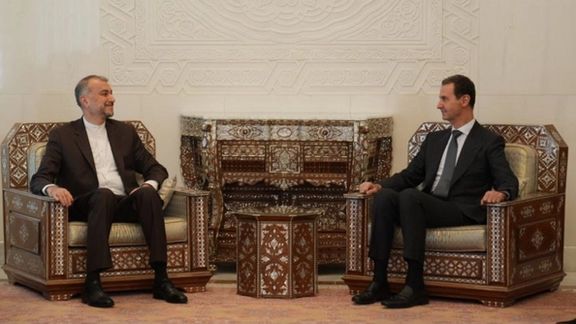
“The Islamic Republic of Iran will keep standing by Syria and its nation in the new situation, as it was the case in difficult times,” he added.
While the Assad regime has thus far refrained from resorting to a full-scale bloodbath to suppress the protests, the situation remains precarious. Some observers within Syria suggest that the Assad regime is still deciding on a course of action, while others fear an escalation of violence in response to the ongoing demonstrations.
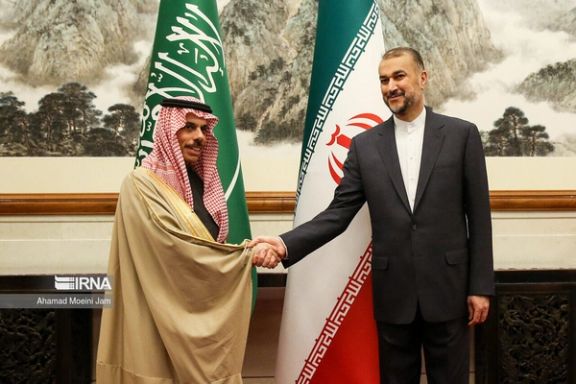
Iran's foreign minister has spoken of the importance of improved Iran-Saudi relations during an official meeting with Syrian President Bashar al-Assad.
Hossein Amir-Abdollahian met the Syrian leader, a close ally to Iran, on Thursday during a two-day visit to the country. The Iranian FM praised the thawing of Iran-Saudi relations as mutually beneficial and regionally significant.
The minister also extended an invitation on behalf of President Ebrahim Raisi, for Assad to visit Tehran whilst expressing satisfaction at the renewed engagement of Syria within the Arab League and the enhancement of Syrian-Arab relations.
This takes place against the backdrop of ongoing reports concerning attacks attributed to Israel on positions affiliated with quasi-military groups linked to the Islamic Republic within Syrian territory.
After Damascus, Amir-Abdollahian will travel to Lebanon for discussions with the leadership of Hezbollah, a proxy militant group associated with Iran.
Amid speculation about potential moves by US forces in Iraq and Syria to address vulnerabilities along the Syrian-Iraqi border, which enables Tehran to transport weapons and fighters through Iraq into Syria, Amir-Abdollahian responded to questions during a press conference by urging US troops to depart from the region. He confidently said, "No party is capable of blocking historic transportation routes."
Furthermore, Amir-Abdollahian slammed Israeli airstrikes targeting sites in Syria and cautioned that such actions would inevitably invite retaliation.
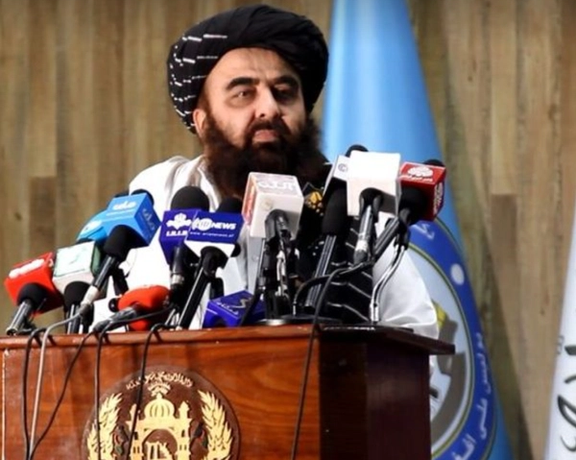
At a religious scholars' gathering in Kabul, the Taliban's Foreign Minister used sarcasm to address countries supporting an all-inclusive government in Afghanistan.
During his address, Amir Khan Muttaqi highlighted the contrast between the number of prisoners held by the Taliban and the reported executions carried out by other countries.
"Our prisons do not have as many inmates as you execute," stated Muttaqi, addressing the countries advocating for the formation of an all-inclusive government. He did not mention any specific nations but many presume his sarcastic remarks were aimed, in part, at the Islamic Republic of Iran, often accused of making opponents disappear and executing them. "In your country, thousands have disappeared, yet nobody dares to ask about it,” Muttaqi said, avoiding directly calling out any one country.
The Taliban's Foreign Minister's remarks come after the international community has consistently called on the Taliban to adopt an inclusive approach in forming a government.
"Do you have an inclusive government?" questioned Muttaqi, his words laced with irony and deliberately undermining the credibility of the governments supporting this initiative.
The Taliban considers the formation of their own system as an internal matter and Mottaqi reiterated the group's stance against external interference.
The international community has also consistently called on the Taliban to adopt an inclusive approach in forming a government. In the past months, tensions between Tehran and Kabul have escalated, resulting in a series of incidents that have strained relations.
One of the deadliest incidents involved a border clash, resulting in the deaths of two Iranian soldiers and one Taliban fighter. The incident followed Iranian President Ebrahim Raisi's warning to the Taliban regarding Iran's water rights under the 1973 treaty. The Taliban responded with defiance, and a former Taliban official's viral video mocked President Raisi's stance.

Iran is slowing the pace at which it is accumulating uranium enriched at 60 percent, the International Atomic Energy Agency (IAEA) is expected to report in September.
Bloomberg reported Thursday that IAEA inspectors are preparing to submit their quarterly report on Iran to members of the agency’s board ahead of their mid-September meeting.
There have been media reports in the past few months that the United States is indirectly negotiating with Iran over a step-by-step approach to relax sanctions in return for a slowdown in Tehran’s nuclear program.
Earlier in August Washington approved the release of $6 billion of Iran’s oil money frozen in South Korea due to US sanctions, in exchange for the eventual release of five US citizens held hostage by the Islamic Republic. This followed a move by the Biden administration in June to allow Iraq to release $2.7 billion it owed Iran for imports of gas and electricity.
The funds will be transferred to Qatar and Oman from where Tehran can use the money for imports of food, medicine and other non-sanctionable goods, according to the United States.
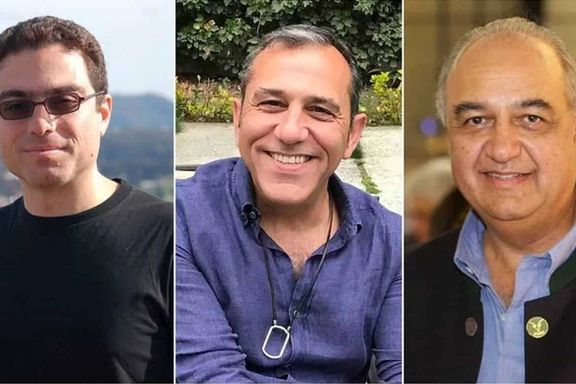
If the IAEA reports a slowdown in Iran’s uranium enrichment, it would strengthen speculations of a non-written and informal deal between Tehran and Washington. While the Biden administration wants to reduce tensions in the region before the US presidential elections next year, it does not want a formal nuclear agreement with Tehran perhaps to avoid Congressional oversight. According to a 2015 law, Congress must have a say in any new nuclear deal.
Already, Iranian oil exports have increased, despite US sanctions, to almost pre-sanctions levels, with the highest shipments reported for August. Iran exported an average of 1.85 million barrels per day, an almost 30 percent jump from previous months.
A Reuters survey published on Thursday showed OPEC’s oil output rose in August as Iranian supply jumped to its highest since 2018, despite ongoing cuts by Saudi Arabia and other members of the wider OPEC+ alliance to support the market.
Iran is exempt from OPEC cuts and its exports have been rising in 2023 despite US sanctions, although views differ as to the exact scale. The overall development, some analysts say, is adding to OPEC+'s challenge in managing the market.
"Iran's output and export data are not transparent and major decision-makers like OPEC+ that adjust their production to balance the market can't be assured of Iran's supplies in the months to come," Sara Vakhshouri of consultant SVB International was quoted by Reuters as saying.
Iran’s oil shipments declined to around 200,000 barrels per day from a high of more than 2 million barrels after the United States withdrew from the JCPOA nuclear deal in 2018 and imposed sanctions. However, Tehran began increasing its exports toward the end of 2020 when President Joe Biden signaled his decision to try to return to the JCPOA. China, Iran’s main customer, apparently seeing signs of a softer approach by the US began increasing its purchases.
Nearly 18 months of talks to revive the JCPOA failed in September 2022, but shortly after secret talks apparently resumed.
The current jump in exports appears to be related to these secret talks between Tehran and Washington. Reuters quoted analysts as saying the higher exports appear to be the result of Iran's success in evading US sanctions and Washington's discretion in enforcing them as the two countries seek better relations.
So far, there is no visible positive signs of higher oil revenues on Iran’s beleaguered economy, because US banking sanctions apparently limit Iran’s hard currency gains from the sales. If the Biden administration also relaxes the banking sanctions, Iran’s annual oil revenues could easily surpass $40 billion.






